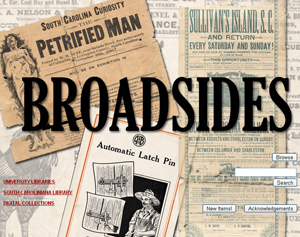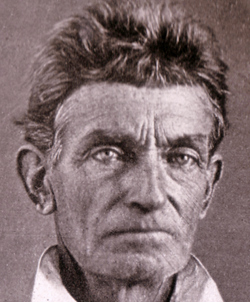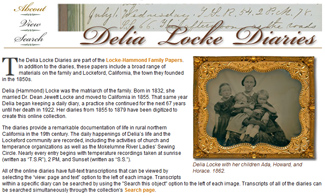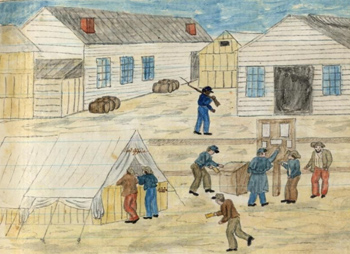The University of South Carolina has a nice digital collection of over two hundred broadsides from the Colonial Era to the present. One can find broadsides related to secession, the Civil War, and a number of other topics. Almost all of the broadsides in this collection were originally printed in South Carolina. Other digital collections are available through the South Carolina Digital Library.
22
Feb
10
Broadsides Collection
Posted by sailerd Published in 19th Century (1840-1880), Images, Letters & Diaries Themes: Battles & Soldiers19
Feb
10
Robert C. Caldwell Collection
Posted by sailerd Published in Civil War (1861-1865), Letters & Diaries Themes: Battles & Soldiers, Women & FamiliesThe Robert C. Caldwell Collection at East Carolina University offers an interesting perspective on life in the South during the Civil War. The collection consists primarily of Robert Caldwell’s letters to his wife between August 1863 and February 1865. He served with the 10th Battalion North Carolina Heavy Artillery, which remained in eastern North Carolina until they were sent to Georgia November 1864. Caldwell owned slaves, but by June 1864 he hoped that “this cruel war” would end and “let…Soldiers return home to our love ones in pece [sic].” In addition, this collection includes several letters from members of his extended family – Private Amzi Harris, who served in the 9th Mississippi Volunteer Regiment, wrote two letters in late 1861 that described Confederate operations in Florida. Mary W. Driskill, who lived on a farm in Georgia with her daughter, explained the hardships she faced while her husband served in the army.
17
Feb
10
The New South Newspaper (1862 -1866)
Posted by sailerd Published in Civil War (1861-1865), Historic Periodicals Themes: Battles & Soldiers The Port Royal New South (1862-1866) offers an interesting perspective on life in the South Carolina lowcountry during the Civil War. The editors published the first issue of their weekly paper in March 1862, which was several months into the Union’s occupation of Port Royal. While it promised to “abstain from the discussion of exciting political topics,” the paper’s ultimate objective was “to strengthen the hands of the government and those who represent it.” This collection, which is available from the University of South Carolina, requires Adobe Reader in order to view any of the newspapers. A number of other interesting digital projects are also available.
The Port Royal New South (1862-1866) offers an interesting perspective on life in the South Carolina lowcountry during the Civil War. The editors published the first issue of their weekly paper in March 1862, which was several months into the Union’s occupation of Port Royal. While it promised to “abstain from the discussion of exciting political topics,” the paper’s ultimate objective was “to strengthen the hands of the government and those who represent it.” This collection, which is available from the University of South Carolina, requires Adobe Reader in order to view any of the newspapers. A number of other interesting digital projects are also available.
16
Feb
10
North Carolina and the Election of 1860
Posted by Published in Antebellum (1840-1861), Letters & Diaries Themes: Contests & Elections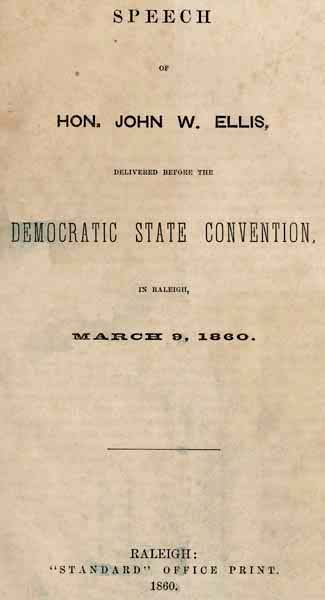 As previously mentioned in this blog, the University of North Carolina at Chapel Hill supports a fantastic website for researching all aspects of the South during the Civil War era called Documenting the American South. On this website, there are several important resources that relate to the crucial election of 1860. A simple search of the collection for the term “election of 1860” does not yield much relevant information; therefore, as is often the case, the subject index is more useful for finding these materials. In this instance, the best materials are found under the heading United States — Politics and Government — 1857-1861. An important document found here is John Willis Ellis’s speech at the 1860 North Carolina Democratic Convention. It presents a look into the Democratic party in North Carolina leading up to the election of 1860. While the speech was an acceptance of his party’s nomination for a second term as governor, Ellis focused on national issues in his address. He attacked William H. Seward, then running for the Republican presidential nomination, and called on Democrats to overlook the divisive issue of the ad valorem tax in favor of party unity. This was supported by western Democrats but opposed by eastern Democrats because it taxed slaves at lower rates. The division of the Democratic party along this (and other) lines was a deciding factor in Republican Abraham Lincoln’s election to the presidency in 1860. In this speech, Governor Ellis saw the divisions already forming in the party, however his warnings were not enough to unite the Democrats.
As previously mentioned in this blog, the University of North Carolina at Chapel Hill supports a fantastic website for researching all aspects of the South during the Civil War era called Documenting the American South. On this website, there are several important resources that relate to the crucial election of 1860. A simple search of the collection for the term “election of 1860” does not yield much relevant information; therefore, as is often the case, the subject index is more useful for finding these materials. In this instance, the best materials are found under the heading United States — Politics and Government — 1857-1861. An important document found here is John Willis Ellis’s speech at the 1860 North Carolina Democratic Convention. It presents a look into the Democratic party in North Carolina leading up to the election of 1860. While the speech was an acceptance of his party’s nomination for a second term as governor, Ellis focused on national issues in his address. He attacked William H. Seward, then running for the Republican presidential nomination, and called on Democrats to overlook the divisive issue of the ad valorem tax in favor of party unity. This was supported by western Democrats but opposed by eastern Democrats because it taxed slaves at lower rates. The division of the Democratic party along this (and other) lines was a deciding factor in Republican Abraham Lincoln’s election to the presidency in 1860. In this speech, Governor Ellis saw the divisions already forming in the party, however his warnings were not enough to unite the Democrats.
15
Feb
10
Conference Commemorating the 150th Anniversary of the Harpers Ferry Raid
Posted by sailerd Published in Antebellum (1840-1861), Video Themes: Slavery & Abolition“John Brown, Slavery, and the Legacies of Revolutionary Violence in Our Own Time,” a conference held in October 2009 at the Gilder Lehrman Center for the Study of Slavery, Resistance, and Abolition (Yale University), is now available online. Over twenty scholars participated in this event, which included four different sessions – “John Brown: A Problem in Biography,” “John Brown and the Arts,” “John Brown and the Legacies of Violence,” “John Brown and Abolitionism.” One can also watch the keynote address (W. Fitzhugh Brundage) and the concluding roundtable (David Blight, Russell Banks, and Tony Horwitz). More information about all of the conference participations is available here. Videos from several other events at the Gilder Lehrman Center are also online, including a discussion with historians David W. Blight Drew Gilpin Faust about Faust’s recent book, The Republic of Suffering: Death and the American Civil War (2008).
13
Feb
10
Seeing Slavery in a Digital Age
Posted by Matthew Pinsker Published in Antebellum (1840-1861), Rare Books Themes: Slavery & Abolition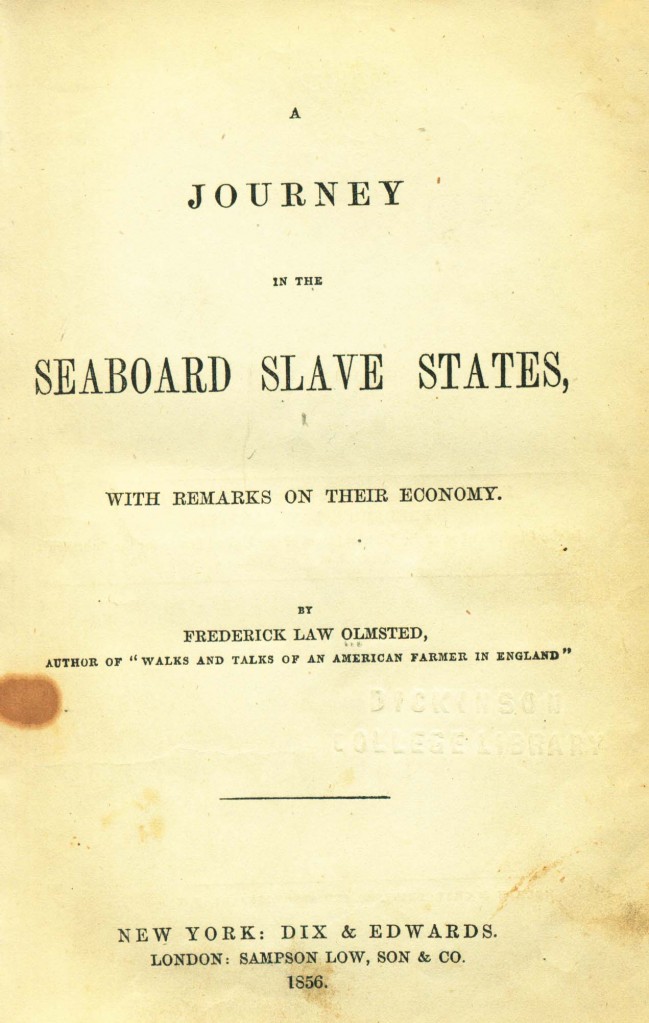 One of the great wonders of the digital age is the ability to read rare books and documents from your desktop. Admittedly, reading online isn’t always easy or fun, but nothing compares to ease of access or the ability to search the full text of these resources. A great case study for this brave new world lies with the study of slavery. There are now thousands of ex-slave narratives, pro- and anti-slavery pamphlets and important nineteenth-century accounts of the peculiar institution, such as Frederick Law Olmsted’s Journey in the Seabord Slave States (1856) that can be searched and researched at greater speed and with more diverse perspectives than ever before. Two of the best digital collections of slavery-related materials are from the University of North Carolina Library’s prize-winning Documenting the American South website and also a newer site called Slavery & Abolition in the US from Dickinson College and Millersville University. Both feature a wide variety of primary source texts that can be searched fruitfully for references to particular topics. For example, a persistent and creative student can look for and find references to antebellum plantation practices or customs such as childhood experiences, relationships with plantation mistresses or the practice of Christianity by slaves. They can compare how abolitionists and pro-slavery pamphleteers argued over “wage slavery” and the treatment of northern workers. Naturally, all of this and much more research has been done before the advent of the Internet, but full-text searching makes such projects much easier. Students in my Civil War class are preparing to launch their own projects on slavery. I hope they will use this blog post to demonstrate my point by commenting on some initial connections they have made between two or more sources in either the DocSouth site or the Slavery & Abolition collection. Please feel free to share quotations and links from rare books that contain insights on the institution of slavery or about the fight over its continued existence in nineteenth-century America. Also, please feel free to report on any frustrations or challenges in using either of these digital collections. They are helpful, but they are not perfect. And, of course, any other readers of the blog should feel encouraged to jump in with their own observations and reports from the front-lines of research and teaching in a digital age.
One of the great wonders of the digital age is the ability to read rare books and documents from your desktop. Admittedly, reading online isn’t always easy or fun, but nothing compares to ease of access or the ability to search the full text of these resources. A great case study for this brave new world lies with the study of slavery. There are now thousands of ex-slave narratives, pro- and anti-slavery pamphlets and important nineteenth-century accounts of the peculiar institution, such as Frederick Law Olmsted’s Journey in the Seabord Slave States (1856) that can be searched and researched at greater speed and with more diverse perspectives than ever before. Two of the best digital collections of slavery-related materials are from the University of North Carolina Library’s prize-winning Documenting the American South website and also a newer site called Slavery & Abolition in the US from Dickinson College and Millersville University. Both feature a wide variety of primary source texts that can be searched fruitfully for references to particular topics. For example, a persistent and creative student can look for and find references to antebellum plantation practices or customs such as childhood experiences, relationships with plantation mistresses or the practice of Christianity by slaves. They can compare how abolitionists and pro-slavery pamphleteers argued over “wage slavery” and the treatment of northern workers. Naturally, all of this and much more research has been done before the advent of the Internet, but full-text searching makes such projects much easier. Students in my Civil War class are preparing to launch their own projects on slavery. I hope they will use this blog post to demonstrate my point by commenting on some initial connections they have made between two or more sources in either the DocSouth site or the Slavery & Abolition collection. Please feel free to share quotations and links from rare books that contain insights on the institution of slavery or about the fight over its continued existence in nineteenth-century America. Also, please feel free to report on any frustrations or challenges in using either of these digital collections. They are helpful, but they are not perfect. And, of course, any other readers of the blog should feel encouraged to jump in with their own observations and reports from the front-lines of research and teaching in a digital age.
12
Feb
10
Reminiscences of My Life in Camp
Posted by Published in Civil War (1861-1865), Rare Books, Recent Scholarship Themes: Battles & Soldiers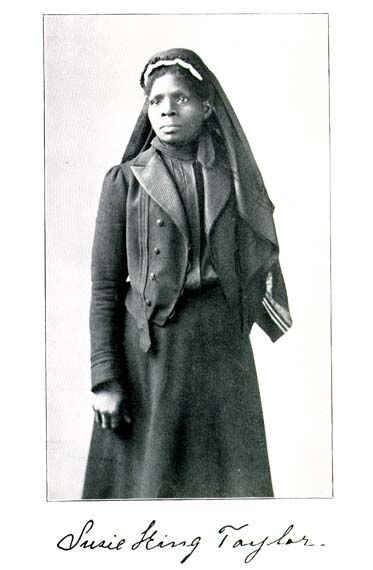 Susie King Taylor, born 1848, wrote a book in 1902 documenting her time spent enrolled as a laundress with the Union’s 1st South Carolina Volunteers, later named 33rd regiment of the United States Colored Troops, during the Civil War. Documenting the American South, an online resource at the University of North Carolina, has her entire book online.
Susie King Taylor, born 1848, wrote a book in 1902 documenting her time spent enrolled as a laundress with the Union’s 1st South Carolina Volunteers, later named 33rd regiment of the United States Colored Troops, during the Civil War. Documenting the American South, an online resource at the University of North Carolina, has her entire book online.
The book makes great use of primary sources, such as the General Order No. 1 of Lt. Colonel C.T. Trowbridge, commander of the regiment.
Taylor’s account is remarkably vivid outlining the struggles of African American Union soldiers fighting in the South. She described how “men and even women would sneer and molest them whenever they met them” while her regiment’s “brave men risked life and limb” to assist the citizens of Charleston, S.C. after the 1865 Confederate retreat and subsequent burning of the city.
This a great online primary resource for anyone interested in the life of African American soldiers during the Civil War. Camp life, battles, occupation, and officer descriptions are all intrinsically linked together in Taylor’s candid narrative of one of the definitive moments in our country’s history.
12
Feb
10
Delia Locke Diaries (1855-1879)
Posted by sailerd Published in 19th Century (1840-1880), Images, Letters & Diaries Themes: Contests & Elections, Women & FamiliesWhen Delia Locke and her husband moved to northern California in 1855, she started a diary that she continued to write in until her death in 1922. Thanks to the University of the Pacific, her diary entries between 1855 and 1879 are available online. Locke not only recorded detailed observations about daily life, but she also commented on major political events. Abraham Lincoln’s victory in the 1860 election was “good news,” as Locke noted on November 16, 1860. Four years later she still supported Lincoln. Even though she could not vote, she had strong opinions about the candidates. While Lincoln “[was] the representative of freedom,” Locke believed that Democrat George McClellan represented “slavery” and led a political “party which [was] composed of traitors at heart.” The University of the Pacific also has other interesting digital projects to explore, including “John Muir Journals,” John Muir Photographs, and several collections related to Japanese-American Internment Camps.
10
Feb
10
John Omenhausser, Civil War Sketchbook (1864-1865)
Posted by sailerd Published in Civil War (1861-1865), Images Themes: Battles & SoldiersConfederate John Jacob Omenhausser, who was captured in 1864 and spent about a year at a Union prison camp in Maryland, filled a sketchbook with over sixty paintings of camp life. The University of Maryland does not have all of Omenhausser’s paintings, but this one is the largest. Omenhausser, who served with the 46th Virginia Infantry, moved to Richmond after the war and worked as a candy maker. He had two children and later died in 1877. The University of Maryland has a number of other interesting digital collections available, including the “Sterling Family Papers” – which I highlighted in a previous post.
8
Feb
10
HarpWeek Political Cartoons
Posted by Published in Antebellum (1840-1861), Images, Lesson Plans Themes: Contests & Elections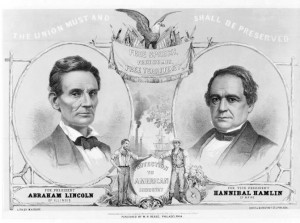 HarpWeek has an online collection of political cartoons from 14 presidential elections between the years 1860-1912. These cartoons provide a visual insight into the climate surrounding the Election of 1860, and its core issues. Some of the cartoons require a lot of prior historical knowledge, while others can be understood with some basic analysis. HarpWeek has convienently provided an analysis and explanation of each cartoon. There are other resources as well for the Election of 1860, including an overview of the historical context and a timeline of important events. Any of these political cartoons would be beneficial to a classroom discussion of this crucial election. This webpage provides a useful guide to using editorial cartoons in the classroom.
HarpWeek has an online collection of political cartoons from 14 presidential elections between the years 1860-1912. These cartoons provide a visual insight into the climate surrounding the Election of 1860, and its core issues. Some of the cartoons require a lot of prior historical knowledge, while others can be understood with some basic analysis. HarpWeek has convienently provided an analysis and explanation of each cartoon. There are other resources as well for the Election of 1860, including an overview of the historical context and a timeline of important events. Any of these political cartoons would be beneficial to a classroom discussion of this crucial election. This webpage provides a useful guide to using editorial cartoons in the classroom.
